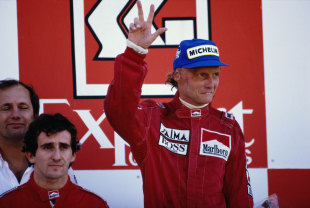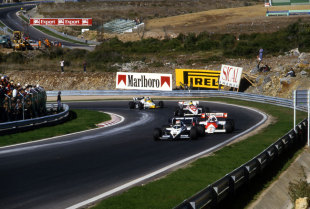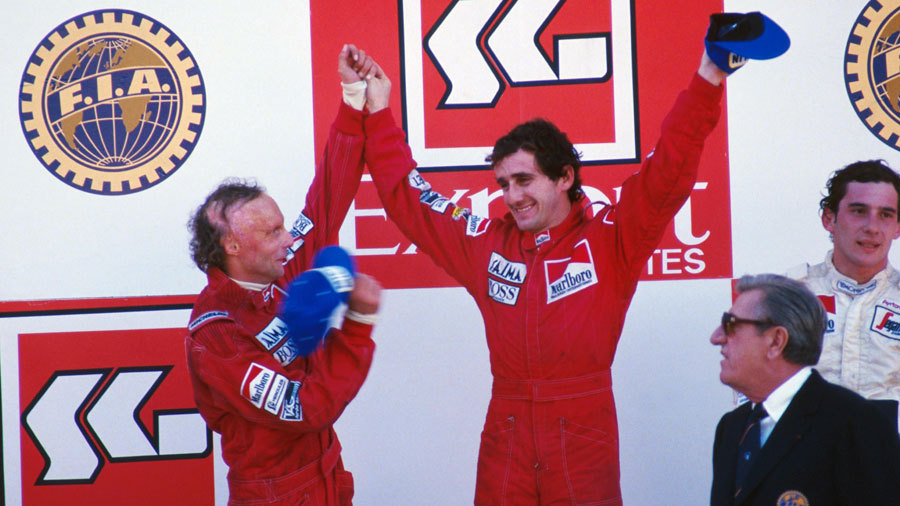

Thirty years ago this weekend, a mere 44,000 fans turned up to watch the finale of a world championship that was ultimately won by half a point. You couldn't have wished for a closer contest between McLaren's Niki Lauda and Alain Prost but it was not enough to draw the locals 20 miles down the road from Lisbon.
This was the first time Estoril had staged a Grand Prix and the first in Portugal since 1960. Paint was still drying when the F1 teams assembled for the 16th and final time in 1984, modifications to the existing track precluding pre-race testing (then very much the norm in the days when a simulator was thought to be some sort of sex toy.)
When an extra day of practice was added on the Thursday, it seemed the police outnumbered the spectators. Keen to create an impression of authority, the officers, complete with batons swinging from their belts and large dogs on leashes, provided security that was unnecessary, certainly for F1 people more intent on sorting this championship than causing a riot.
Matters would reach an absurd level on Friday when heavy rain and a flash flood tested an already inadequate drainage system to the limit and beyond. With practice suspended, mechanics began an impromptu game of soccer on the main straight.
This was clearly not on the police manifesto of acceptable behaviour. Truncheons were drawn and the ball was confiscated by an officer with even more swagger than his young colleagues. Knowing about police matters (although not yet a Special Constable on the Isle of Man), Nigel Mansell vaulted the pit wall and demanded the ball back. An international incident was avoided when the ball was returned and an over-excited police dog bit its handler on the backside - much to the amusement of spectators who clearly had no more love for the overbearing gendarmerie than we did.
A delay of a more worrying kind would occur when practice resumed. Gerhard Berger, in only his fourth Grand Prix, spun and sprayed trackside stones with enough force to injure a marshal. The ATS-BMW then thumped and completely demolished the barrier, bringing another long delay. No one said a word about a different and more serious brand of security shortcoming that went far beyond the remit of policemen in sunglasses and high boots.
Things were different then, of course. The first two corners, following downhill in quick succession, had minimal run-off on the first and none on the second. This was because there was a drop to oblivion in a natural valley beyond. The attitude was: 'What can we do?' And that seemed to be the end of it.
The best place to watch, I thought, would be on the inside of the second turn. I was standing by the barrier, following one of the McLarens through the exit when there was a sharp pain in the side of my left foot. I had the fright of my life to discover I was being attacked by a light green Benetton Alfa Romeo, the nose wing of Riccardo Patrese's car having speared underneath the barrier and been wrenched off as he spun past at speed. When I add that the barrier all around the circuit was only two layers high, you'll understand why I go weak at the knees now when I think of my stupidity in choosing to stand where I did.

How things change. At the time, I described the facilities as being 'pretty impressive'; Bernie Ecclestone and Charlie Whiting would have a collective fit if presented with them today. Nonetheless, the worry was that this tremendous climax to the championship would be affected by an incident of some sort on a track that, even then, seemed absurdly narrow.
Going into this race, Lauda led Prost by 3.5 points; the half point coming from Monaco when a drenched track had caused the race to be stopped before three-quarter distance and half points awarded. With nine points for first place and six for second, to become champion for the first time Prost had to win with Lauda third or lower.
Prost's chances looked better than expected when he took a place on the front row alongside Nelson Piquet's pole position Brabham-BMW, with Lauda qualifying back 11th place. Niki didn't help himself with a spin but his biggest problem had been a down-on-power TAG turbo V6, the shortfall in performance causing one or two journalists to suggest Marlboro McLaren might be stitching him up. Lauda's rebuttal was direct then as it would be now if asked the same question about either of his drivers at Mercedes.
Lauda knew he had nothing to lose. After a cautious first lap, he methodically worked through the field; ninth on lap 6, seventh on lap 18, fifth lap 28, then fourth, then third. On lap 51, he set fastest lap. At that very moment, Mansell spun out of second place with brake trouble on the JPS Lotus-Renault.
Prost was leading; there was no more he could do. He'd won seven races to Lauda's five; beaten the Austrian in all but one qualifying. But Niki was champion as the crossed the line, McLaren mechanics leaping onto the track.
Fortunately the officers of the law had long since lost interest and gone home, otherwise the post-race scenes would have been even more chaotic. Prost, although understandably disappointed, was magnanimous in his praise, a relieved and happy Lauda returning the compliment by saying with all sincerity that time was on Prost's side and he would take the title the following year.
Then Niki went off to find the man from Marlboro who, Lauda had been told, had quietly arranged for the pre-race production of several hundred posters declaring Prost as World Champion. The language, by all accounts, was colourful. That much hasn't changed.

Enjoy Maurice's blogs? Vote for him in the UK Blog Awards
Maurice Hamilton writes for ESPN F1.
© ESPN Sports Media Ltd.
 Maurice Hamilton writes for ESPN F1. A veteran journalist in the paddock, Maurice Hamilton has been part of the Formula One scene since 1977 and was the Observer's motor racing correspondent for 20 years. He has written several books as well as commentating on Formula One for BBC Radio 5 Live
Maurice Hamilton writes for ESPN F1. A veteran journalist in the paddock, Maurice Hamilton has been part of the Formula One scene since 1977 and was the Observer's motor racing correspondent for 20 years. He has written several books as well as commentating on Formula One for BBC Radio 5 Live
